Unit 5 Good manners Welcome to the unit课件19张
文档属性
| 名称 | Unit 5 Good manners Welcome to the unit课件19张 |

|
|
| 格式 | zip | ||
| 文件大小 | 2.3MB | ||
| 资源类型 | 教案 | ||
| 版本资源 | 牛津译林版 | ||
| 科目 | 英语 | ||
| 更新时间 | 2022-01-05 00:00:00 | ||
图片预览

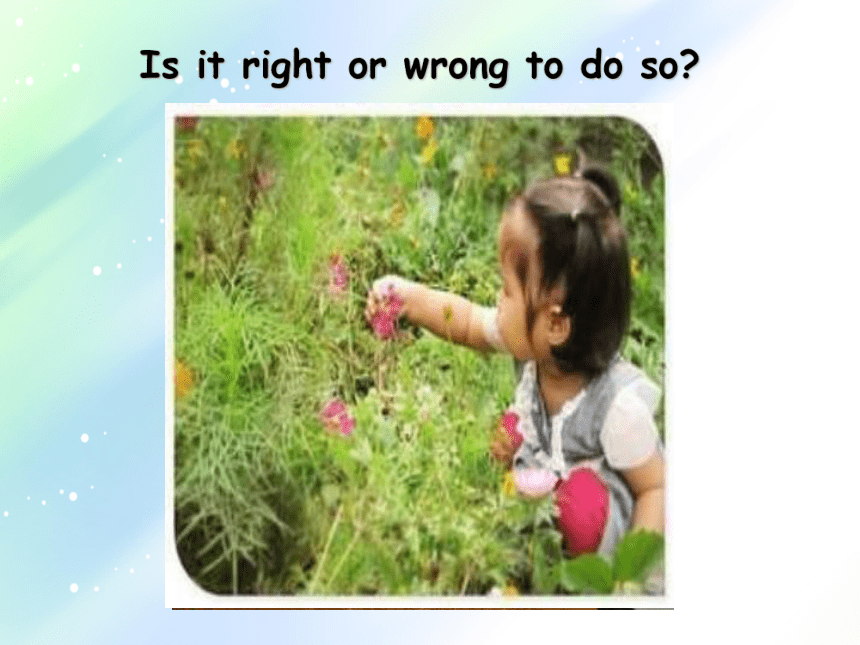
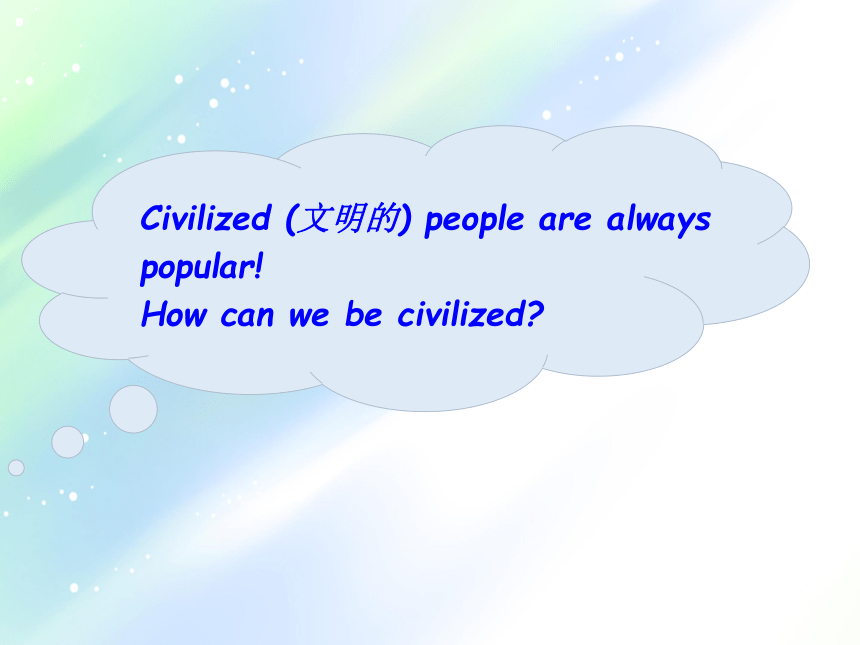
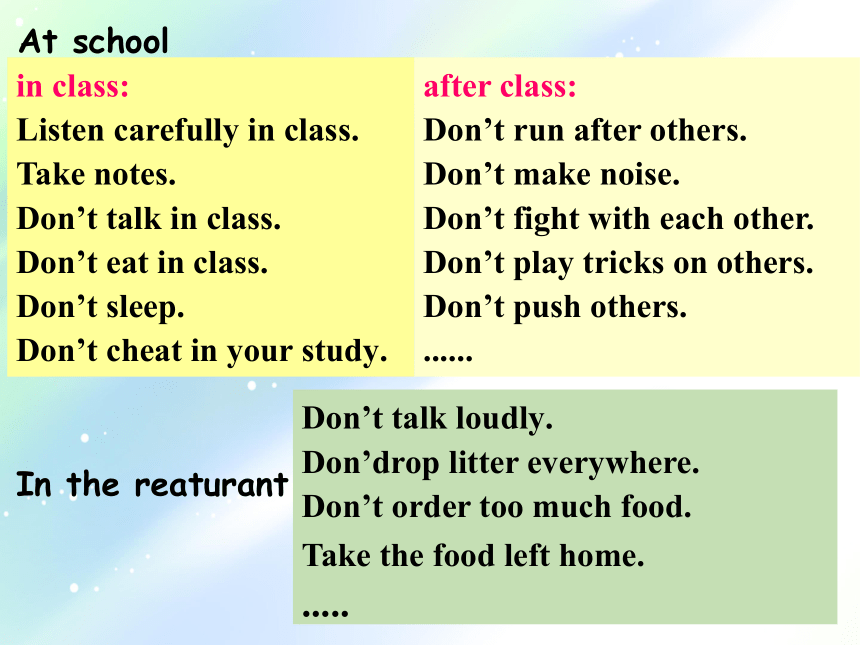
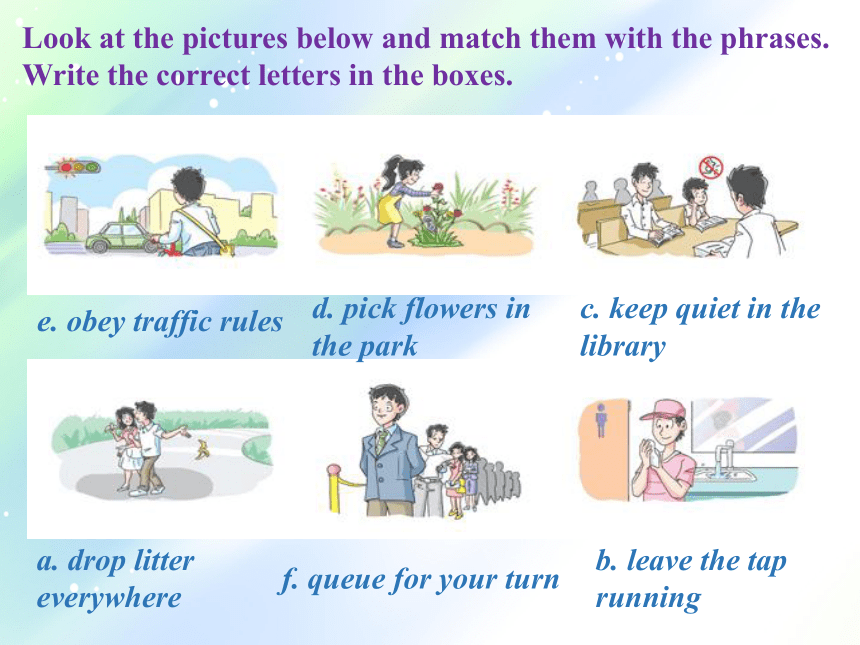
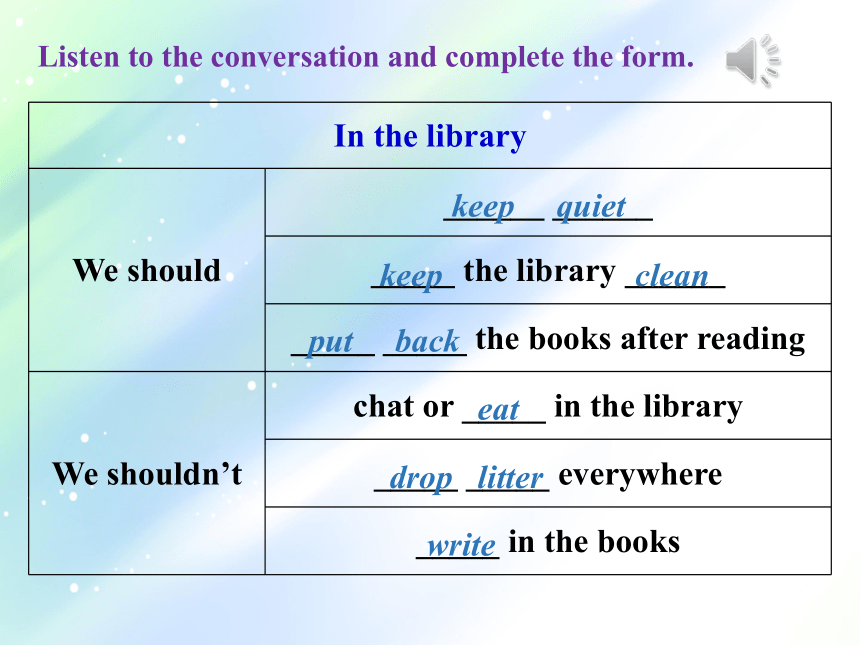
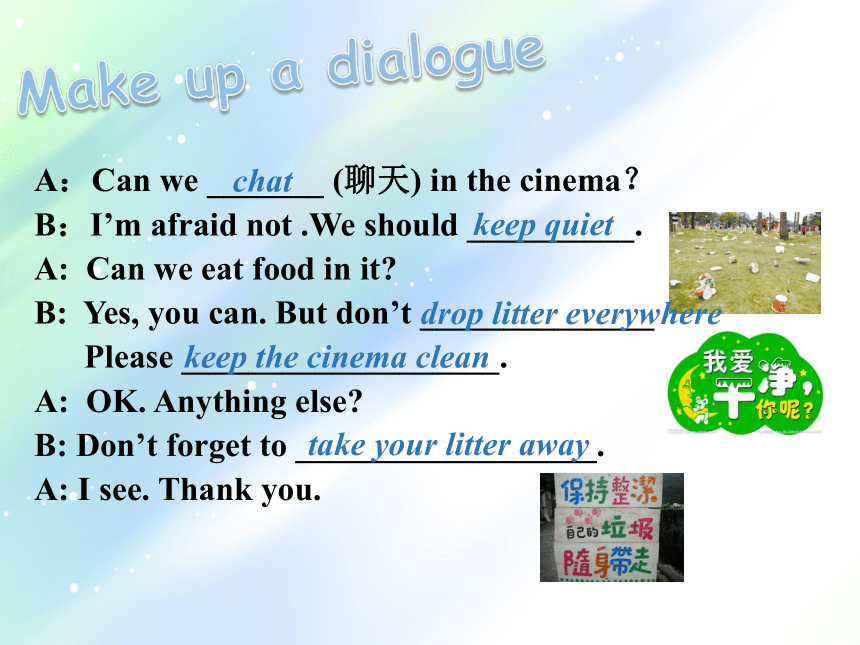
文档简介
(共19张PPT)
Unit 5 Good manners
Comic Strip & Welcome to the unit
Is it right or wrong to do so
Civilized (文明的) people are always
popular!
How can we be civilized
At school
in class:
Listen carefully in class.
Take notes.
Don’t talk in class.
Don’t eat in class.
Don’t sleep.
Don’t cheat in your study.
after class:
Don’t run after others.
Don’t make noise.
Don’t fight with each other.
Don’t play tricks on others.
Don’t push others.
......
Don’t talk loudly.
Don’drop litter everywhere.
Don’t order too much food.
Take the food left home.
.....
In the reaturant
Look at the pictures below and match them with the phrases. Write the correct letters in the boxes.
e. obey traffic rules
d. pick flowers in the park
c. keep quiet in the library
a. drop litter everywhere
f. queue for your turn
b. leave the tap running
In the library
We should ______ ______
_____ the library ______
_____ _____ the books after reading
We shouldn’t chat or _____ in the library
_____ _____ everywhere
_____ in the books
keep quiet
keep clean
put back
eat
drop litter
write
Listen to the conversation and complete the form.
A:Can we _______ (聊天) in the cinema?
B:I’m afraid not .We should __________.
A: Can we eat food in it
B: Yes, you can. But don’t ______________
Please ___________________.
A: OK. Anything else
B: Don’t forget to __________________.
A: I see. Thank you.
Make up a dialogue
chat
keep quiet
drop litter everywhere
keep the cinema clean
take your litter away
Use Amy and Shirley’s dialogue as an example to make your own conversation. You can choose the classroom or the dining hall in our school.
A: Can we … in …?
B: I'm afraid not. We should ….
A: Anything else
B: Don’t … Always….
A: I see. Can we …?
B: Yes, we can….
No, we can’t/shouldn’t ….
keep quiet
keep … clean
queue for the turn
drop litter everywhere
run after others
shout/push …
Pair work
Eddie and Hobo are talking about manners. Listen to their conversation and answer the following answers.
Listen and answer
1. Do you think Eddie really wants to teach Hobo
No.
2. What does Eddie really want from Hobo
The cake.
3. What good manners does Eddie teach Hobo
First, always share things with others. Second, don’t cut in on others. Always wait politely.
Fill in the blanks according to the dialogue.
Eddie tells Hobo that he is old _________ to learn about manners. With a cake in his hand, Hobo doesn’t know what Eddie means. Eddie starts to ________ Hobo some good manners. First, Eddie asks Hobo to always _______ things with others. While saying so, he takes the ______ from Hobo’s hand. Hobo is surprised, and he shouts, “Hey! That’s _______!” But Eddie asks Hobo to always _______ politely instead of _______ in on others.
Hobo is very _______ . He talks back, “You should _______ about manners too. You’re _______ too old to learn.”
enough
teach
share
cake
mine
wait
cutting
angry
learn
never
Act it out
Language points
1. You’re old enough to learn about manners now.
主语 + be + adj. + enough + to do sth.
某人足够……做某事
e.g. Tom is strong enough to lift the box.
Practice:
1. She’s not strong enough _________ walking up mountains.
A. to go B. going C. go D. went
2. Jack is always ___________ to wait for a long time without getting angry.
A. too patient B. patient enough
C. enough patient D. very patient
2. Second, don’t cut in on others.
cut in (on sb./sth.) 打断(谈话),插嘴;强行超车
e.g. Don’t cut in when others are talking.
He kept cutting in on our conversation.
He cut in on a red car.
Practice:
1. As we all know, it’s impolite to __________ others.
A. cut in on B. cut in
C. cut out D. cut on
2. I was talking to Mary when Jason _________, “Hey, guys, what’s up ”
A. cut in B. cut down
C. cut out D. cut in on
3. You’re never too old to learn.
too … to …意为“太……而不能……”;当“too … to …” 结构前出现了not,only, but, all, never时,该结构的句子没有了否定意义。
e.g. Swimming is not too difficult to learn.
We are only too pleased to go with her.
It is never too late to mend.
Practice:
1. My little brother is ___________ to go to school. He needs to stay at home with my mum.
A. so young B. young enough
C. too young D. that young
4. queue for your turn 排队等候
turn n. 轮流, (轮流)的顺序
in turn 依次;轮流
take turns to do sth. = do sth. in turn 轮流做某事
It’s one’s turn to do sth. 轮到某人做某事
e.g. Please wait your turn.
Whose turn is it next
It is my turn to treat us today.
Useful phrases and expressions
1. share sth. with sb. 和某人分享某物
2. drop litter everywhere 乱扔垃圾
3. leave the tap running 让水龙头的水一直流着
4. pick flowers 摘花,采花
5. obey traffic rules 遵守交通规则
6. put back 把……放回原处
7. You’re never too old to learn. 活到老,学到老。
Exercises
一. 根据首字母及汉语提示补全单词
1. Her ____________ (manner) made us feel relaxed.
2. Don’t ______ (pick) flowers in the garden.
3. As a student, we must _______ (obey) the school rules.
4. “I’m afraid you can’t do like that,” she said to me __________ (polite).
5. You should remember not to leave the tap __________ (run).
6. He is patient enough _______ (listen) to the old man.
7. You are never too old ___________ (learn).
manners
pick
obey
politely
running
to listen
to learn
二. 单项选择
1. It’s impolite to cut in line when you ______ a bus at the bus stop.
A. ask for B. look for C. care for D. wait for
2. ---Who do you want to help most at present
---Children in poor areas. Because many of them are _______ poor ______ go to school.
A. enough; to B. too; to
C. so; that D. such; that
3. You two live in the same community now. It’s too hard _______ you to avoid______ her.
A. of; meeting B. for; to meet
C. for; meeting D. of; to meet
Thank you!
Unit 5 Good manners
Comic Strip & Welcome to the unit
Is it right or wrong to do so
Civilized (文明的) people are always
popular!
How can we be civilized
At school
in class:
Listen carefully in class.
Take notes.
Don’t talk in class.
Don’t eat in class.
Don’t sleep.
Don’t cheat in your study.
after class:
Don’t run after others.
Don’t make noise.
Don’t fight with each other.
Don’t play tricks on others.
Don’t push others.
......
Don’t talk loudly.
Don’drop litter everywhere.
Don’t order too much food.
Take the food left home.
.....
In the reaturant
Look at the pictures below and match them with the phrases. Write the correct letters in the boxes.
e. obey traffic rules
d. pick flowers in the park
c. keep quiet in the library
a. drop litter everywhere
f. queue for your turn
b. leave the tap running
In the library
We should ______ ______
_____ the library ______
_____ _____ the books after reading
We shouldn’t chat or _____ in the library
_____ _____ everywhere
_____ in the books
keep quiet
keep clean
put back
eat
drop litter
write
Listen to the conversation and complete the form.
A:Can we _______ (聊天) in the cinema?
B:I’m afraid not .We should __________.
A: Can we eat food in it
B: Yes, you can. But don’t ______________
Please ___________________.
A: OK. Anything else
B: Don’t forget to __________________.
A: I see. Thank you.
Make up a dialogue
chat
keep quiet
drop litter everywhere
keep the cinema clean
take your litter away
Use Amy and Shirley’s dialogue as an example to make your own conversation. You can choose the classroom or the dining hall in our school.
A: Can we … in …?
B: I'm afraid not. We should ….
A: Anything else
B: Don’t … Always….
A: I see. Can we …?
B: Yes, we can….
No, we can’t/shouldn’t ….
keep quiet
keep … clean
queue for the turn
drop litter everywhere
run after others
shout/push …
Pair work
Eddie and Hobo are talking about manners. Listen to their conversation and answer the following answers.
Listen and answer
1. Do you think Eddie really wants to teach Hobo
No.
2. What does Eddie really want from Hobo
The cake.
3. What good manners does Eddie teach Hobo
First, always share things with others. Second, don’t cut in on others. Always wait politely.
Fill in the blanks according to the dialogue.
Eddie tells Hobo that he is old _________ to learn about manners. With a cake in his hand, Hobo doesn’t know what Eddie means. Eddie starts to ________ Hobo some good manners. First, Eddie asks Hobo to always _______ things with others. While saying so, he takes the ______ from Hobo’s hand. Hobo is surprised, and he shouts, “Hey! That’s _______!” But Eddie asks Hobo to always _______ politely instead of _______ in on others.
Hobo is very _______ . He talks back, “You should _______ about manners too. You’re _______ too old to learn.”
enough
teach
share
cake
mine
wait
cutting
angry
learn
never
Act it out
Language points
1. You’re old enough to learn about manners now.
主语 + be + adj. + enough + to do sth.
某人足够……做某事
e.g. Tom is strong enough to lift the box.
Practice:
1. She’s not strong enough _________ walking up mountains.
A. to go B. going C. go D. went
2. Jack is always ___________ to wait for a long time without getting angry.
A. too patient B. patient enough
C. enough patient D. very patient
2. Second, don’t cut in on others.
cut in (on sb./sth.) 打断(谈话),插嘴;强行超车
e.g. Don’t cut in when others are talking.
He kept cutting in on our conversation.
He cut in on a red car.
Practice:
1. As we all know, it’s impolite to __________ others.
A. cut in on B. cut in
C. cut out D. cut on
2. I was talking to Mary when Jason _________, “Hey, guys, what’s up ”
A. cut in B. cut down
C. cut out D. cut in on
3. You’re never too old to learn.
too … to …意为“太……而不能……”;当“too … to …” 结构前出现了not,only, but, all, never时,该结构的句子没有了否定意义。
e.g. Swimming is not too difficult to learn.
We are only too pleased to go with her.
It is never too late to mend.
Practice:
1. My little brother is ___________ to go to school. He needs to stay at home with my mum.
A. so young B. young enough
C. too young D. that young
4. queue for your turn 排队等候
turn n. 轮流, (轮流)的顺序
in turn 依次;轮流
take turns to do sth. = do sth. in turn 轮流做某事
It’s one’s turn to do sth. 轮到某人做某事
e.g. Please wait your turn.
Whose turn is it next
It is my turn to treat us today.
Useful phrases and expressions
1. share sth. with sb. 和某人分享某物
2. drop litter everywhere 乱扔垃圾
3. leave the tap running 让水龙头的水一直流着
4. pick flowers 摘花,采花
5. obey traffic rules 遵守交通规则
6. put back 把……放回原处
7. You’re never too old to learn. 活到老,学到老。
Exercises
一. 根据首字母及汉语提示补全单词
1. Her ____________ (manner) made us feel relaxed.
2. Don’t ______ (pick) flowers in the garden.
3. As a student, we must _______ (obey) the school rules.
4. “I’m afraid you can’t do like that,” she said to me __________ (polite).
5. You should remember not to leave the tap __________ (run).
6. He is patient enough _______ (listen) to the old man.
7. You are never too old ___________ (learn).
manners
pick
obey
politely
running
to listen
to learn
二. 单项选择
1. It’s impolite to cut in line when you ______ a bus at the bus stop.
A. ask for B. look for C. care for D. wait for
2. ---Who do you want to help most at present
---Children in poor areas. Because many of them are _______ poor ______ go to school.
A. enough; to B. too; to
C. so; that D. such; that
3. You two live in the same community now. It’s too hard _______ you to avoid______ her.
A. of; meeting B. for; to meet
C. for; meeting D. of; to meet
Thank you!
